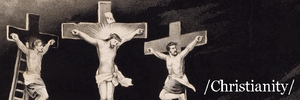>>11805
> Buddha NEVER said there is no god or confirm there is god, he just said it's not importance for have happiness of mind
And here we come to the fundamental difference between Buddhism and all forms of Christianity. The Buddhism does the best that can be done in order to save without God the man. True salvation without God, however, is impossible. Therefore, the Buddhist path is a path leading to self-destruction. According to Buddhism any desire leads to suffering, any attraction leads to suffering, etc., therefore the Buddhism teaches us to destroy our emotions, desires, etc., to destroy absolutely anything which makes you your very self.
I am unaware of any official statement about this in the Western Christianity, but the popular theory is that some of the faculties of our soul are good and others are bad. For example the love is good and the anger is bad.
In the Orthodox Christianity all faculties of our soul are created by God and good. It is not our ability to desire, to be attracted, to hate, etc. what causes us to suffer but rather the bad state of these faculties. The men are detached from God, they are immersed in worldly matters. Therefore, we desire what we can not have, we want to do what we can not do, we hate what we can not fight. We are totally unable to transcend above the world, our state is hopelessness. Probably the best one can do in such a state is what the Buddhism proposes. This, however, is not nearly enough. Therefore, Christ, the Son of God descends and comes to us in order to give us a path leading to true salvation.
One of the pillars in the Orthodox theology is that the descent of the Son of God is not just in appearance in order to communicate some theory. The Son of God, being eternal God is born as man and actually becomes man. In Christ the human becomes linked with the divine, his human mind enlightened with divine knowledge, his human will perfectly aligned with his divine will, his human emotions in divinely perfect state. Through the union in Christ of God and man (including the death) the descent of the Holy Spirit and the union of each of us with God becomes possible. Only through such a union with God one can have desires and other emotions which do not lead to suffering.
It should be noted that in the union in the Holy Spirit with God all faculties of the soul (mind, emotions, will) obtain potential which they do not originally have. Without this new potential, a man would suffer regardless of the state of his mind, emotions, will, etc. The Orthodox Church is the community of the people who have believed in the good message about the true salvation. And just as each member of our body has its own function, so each member of the Church is given different gifts by God for his own benefit and the benefit of the whole organism of the Church. "For to one is given through the Spirit the utterance of wisdom, and to another the utterance of knowledge according to the same Spirit, to another faith by the same Spirit, to another gifts of healing by the one Spirit, to another the working of miracles, to another prophecy, to another the ability to distinguish between spirits." (1 Cor. 12:8-10) Therefore, the salvation does not require the destruction of our person-hood, as in the Buddhism. The perfect union with the One God does not destroy us. "There are varieties of gifts, but the same Spirit; and there are varieties of service, but the same Lord; and there are varieties of activities, but it is the same God who empowers them all in everyone." (1 Cor. 12:4-6) God is one and indivisible, the operations of God, however, are various and different in each of us. Nevertheless, in each of these different operations of God we see the same One, simple and indivisible God. Here we see in action the famous essence/energy distinction of the Orthodox theology.
Although the union with God in the Holy Spirit is accessible not just to few chosen ones but to everyone, it is impossible to formulate in human words a proper description of this union. Our language is limited to notions based in our world and the union with God is not of this world. An outside spectator can see the life in the Spirit, for example, in a martyr who remains calm and undisturbed before his death, or in a hermit who does seemingly impossible feats and considers them nothing. Ap. Paul describes the life in the Spirit with the following words: "We are afflicted in every way, but not crushed; perplexed, but not driven to despair; persecuted, but not forsaken; struck down, but not destroyed; always carrying in the body the death of Jesus, so that the life of Jesus may also be manifested in our bodies. For we who live are always being given over to death for Jesus’ sake, so that the life of Jesus also may be manifested in our mortal flesh." (2 Cor. 4:8-11)
